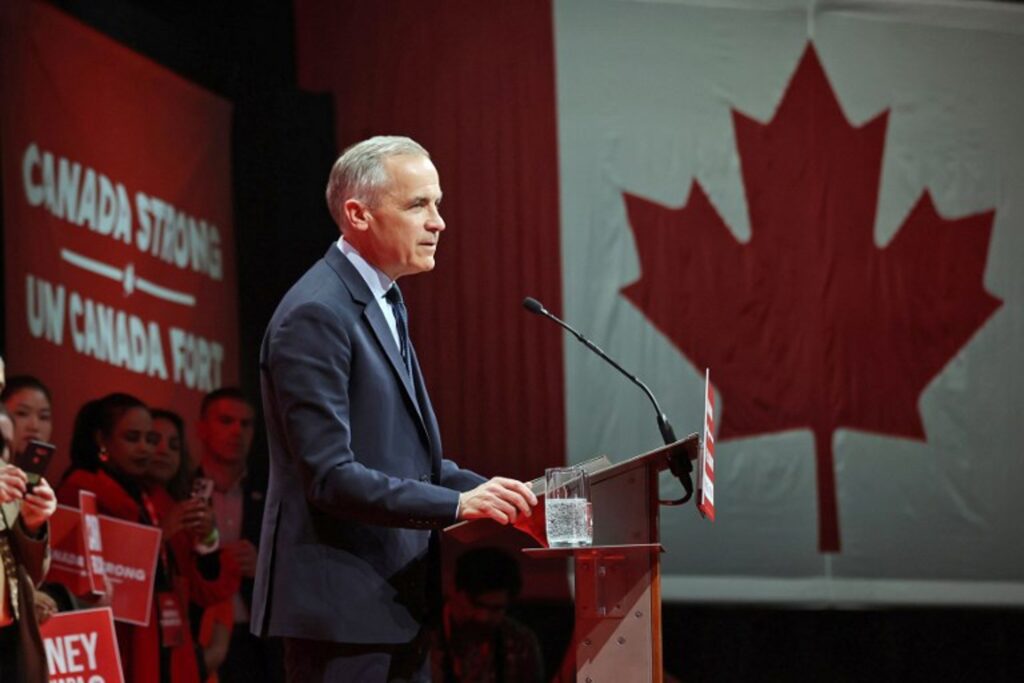Mark Carney's Liberal Party has won the Canadian general election, following a campaign focused on the threats posed by US President Donald Trump. However, he appears to have secured too few seats to secure an absolute majority in parliament.
With around 95% of polling stations counted, Carney's ruling party stands at 43.2%. Its main opponent, Pierre Poilievre's Conservative Party, has to settle for 41.7% of the votes. However, a majority does not seem likely.
According to the latest projections on Tuesday morning, the Liberals will win 167 seats, but 172 seats are needed for a majority in parliament. If this is the case, Carney will probably lead a minority government. He will therefore need the support of other parties to pass laws through parliament.
The Trump effect
Just months ago, it seemed likely that Poilievre's Conservatives would return to power after Justin Trudeau's decade-long tenure. However, Donald Trump's return to the White House and his unprecedented offensive against Canada, involving tariffs and annexation threats, changed the political landscape.
In Ottawa, where Liberals gathered for their election night, the announcement of the results prompted cheers and applause.
"I'm so happy," said Dorothy Goubault (72) from the Thousand Islands region of Ontario. "I'm pleased because we have someone who can communicate with Mr Trump on his level. Mr Trump is a businessman. Mr Carney is a businessman, and I believe they can both understand each other."
European Commission President Ursula von der Leyen congratulated Carney on his election victory. "I look forward to working closely together, both bilaterally and within the G7," she said on Tuesday morning.
Congratulations to @MarkJCarney and the Liberal Party on their election victory.
The bond between Europe and Canada is strong — and growing stronger. I look forward to working closely together, both bilaterally and within the G7. We'll defend our shared democratic values,… — Ursula von der Leyen (@vonderleyen) April 29, 2025
In his victory speech, Carney emphasised the importance of unity in his country. "Let's put an end to the division and anger of the past. We are all Canadians, and my government will work for everyone and with everyone."
Poilievre has conceded defeat in the election and congratulated Carney on his victory. "The Conservatives will work with the prime minister and all parties to defend Canada's interests," Poilievre told his supporters.
Leading in tumultuous times
At 60 years old, Carney is a political novice but a respected economist, and managed to persuade a concerned populace that he is the right leader for these tumultuous times.
The former governor of the Banks of Canada and Britain repeatedly stressed during his campaign that the American threat to Canada is real. "They want our resources, our water. The Americans want our country," he warned.
"Chaos has entered our lives. It's a tragedy, but it's also a reality. The key question in this election is who is best positioned to stand up to President Trump?" he argued throughout his campaign.
To combat these threats, he pledged to maintain tariffs on US products as long as Washington's measures remain in place. He also promised to boost domestic trade by removing provincial barriers and to seek new markets, particularly in Europe.
Related News
- Amnesty International sends 'strongest warning ever' on Trump day 100
- 'Move fast and break things': Trump's first 100 days as US President
- Record number of Canadians cast vote early ahead of Monday's election
Meanwhile, the Conservative leader, who had promised tax cuts and reduced public spending, failed to convince voters in this G7 nation, the world's ninth-largest economy, to turn away from the Liberals.
Analysts suggest Poilievre suffered from associations with the American president through his style and some ideas, alienating part of the electorate.
Nearly 29 million of Canada's 41 million residents were called to the polls in the vast G7 country spanning six time zones. A record 7.3 million people voted in advance.

